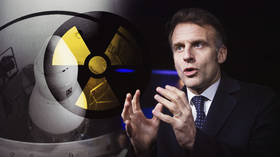Costly ‘paper tiger’: EU army plans under scrutiny for financial reasons
The idea to create a united European Union army may be discussed at the EU summit in June. However, even those who support the idea are doubtful whether member states can afford it, as most nations must fulfill their commitments to NATO.
The timing of discussion was announced by European Commission spokesman Margaritis Schinas.
Germany was the first country to support the idea voiced by EU Commission president Jean-Claude Juncker. German government representative Christiane Wirtz said that Chancellor Angela Merkel is open to the project of a European Union joint army, but stressed that such a plan cannot be immediately realized.
The proposal is not exactly new; it was on Juncker’s agenda during his election campaign, but appeared even earlier in 2013.
In December of that year, British Prime Minister David Cameron said: "It isn't right for the European Union to have capabilities, armies, air forces and the rest of it. We need to get that demarcation correct between cooperation which is right and EU capabilities, which is wrong."
The financial aspect, however, has raised doubts even among supporters of the idea. Finland’s Foreign Affairs Minister Erkki Tuomioja told local media Yle that European countries do not have the opportunity or funds to create a joint armed forces. He stated that while the idea is attractive for the long-run, it could not replace the armies of certain countries completely.
READ MORE: NATO summit: Obama, Cameron urge allies to ramp up military spending
There are also concerns whether the new unit is needed, as there is already military cooperation within NATO. The bloc’s members must allocate a minimum of two percent of GDP on defense spending – a requirement which not all of them can meet.
Finland’s parliament defense commission chairman Jussi Niinisto pointed out that 22 of 28 European countries are NATO members: “It’s difficult to imagine especially in the current economic situation that along with NATO, some other duplicating structures will be created. We already have European Union Force, which were never properly used,” he said. “It was a paper tiger aimed at giving mercenary armies some rest. Now they propose to create the same kind of paper tiger.”
Overlapping missions are also a concern. For example, the European Union Naval Force Somalia's 'Operation Atalanta' – aimed at stopping Somalia's piracy – was criticized for spending money on the mission, which is remarkably similar to NATO's 'Operation Ocean Shield.'
Estonia’s parliament foreign affairs commission chairman Marko Mihkelson also supported this stance, saying the proposed army would simply duplicate NATO and not strengthen European security.
“Those European Union countries which are also NATO members should just increase their defense spending within the NATO budget. Any kind of duplication or creation of new structures will not increase Europe’s safety. Vice versa it may serve to the benefit of those who would be happy to see confrontation between the European Union and the US or cancellation of transatlantic cooperation,” he told Delfi website, as quoted by RIA Novosti.
NATO rolls out 'Russian threat' in budget battle http://t.co/lGOv8H7bkHpic.twitter.com/D7PbA49YDI
— RT (@RT_com) March 2, 2015
The statement was made at a time when the US shipped 120 armored units – including tanks – to Latvia, to improve the Baltic country's defenses. A new round of military drills should also begin in the Black Sea; six NATO warships arrived there on Wednesday to take part in exercises with the Bulgarian, Romanian, and Turkish navies.
READ MORE: 6 NATO ships to stage war games in Black Sea
European Commission President Jean-Claude Juncker believes an EU army could help counter a possible threat from Russia. He also said that EU’s image "has suffered dramatically and also in terms of foreign policy, we don't seem to be taken entirely seriously."
Meanwhile, former Deputy Speaker of the Belgian Parliament Lode Vanoost believes the move is also aimed against Washington. “Actually, this whole idea has historical precedents. Right after WWII, at the beginning of the Cold War, there was already an idea for the European defense community. That failed in 1954, and the Western European Union was founded. So the idea itself is not new at all.”
“The context today, of course, is different. The conservative forces within Europe want to establish themselves again as an entity next to the US. This idea floated by, and it is not just aimed at Russia, it is aimed at the US as well. Conservative forces don’t like the whole idea of America dominating Europe,” he told RT.












